There are certain situations when ketone testing is needed to reduce the risk of critical complications of diabetes. Options are using plasma blood with a meter to check for ketones or using urine testing kits. We will review which is more beneficial. Let’s first look at the basics of ketones and when they can cause a possible life threatening situation.
What are ketones?
Ketones are formed when fat is used as an energy source instead of carbohydrates. There are dietary ketones which are formed on a low- or no-carbohydrate diet with a high fat/protein intake; when blood sugars are controlled these ketones are not dangerous. When blood sugars are uncontrolled the carbohydrate source may be available, but with no (Type 1 Diabetes) or little (Type 2 Diabetes) insulin present, the body relies on fat breakdown for energy source; ketones are a toxic by product of the fat breakdown. Ketones circulate in the system as acids and change the PH of the blood, resulting in DKA or Diabetic Keto-acidosis. This is a serious medical situation and must be treated.
What is DKA and what are the symptoms?
Diabetic Ketoacidosis (DKA) is a condition that can occur when people have diabetes type 1 and are suffering from illness, excessive stress, or lack of insulin delivery. It can be because of a displaced insulin pump or using expired insulin. Although less common, it can occur in those who have diabetes type 2 when they are ill, have an infection, are severely stressed or prone to ketone production. The ketones accumulate in the blood, eventually go to the kidneys and are released from the body through urine. Ketone production can also occur in pregnant women with diabetes or women who develop gestational diabetes when pregnant. Ketones can form in patients who are switched from exogenous insulin to oral agents for diabetes treatment; ketone production would indicate a poor response to the oral medications. Ketosis can occur in people who have eating disorders like Anorexia, starvation or Bulimia. Even large amounts of alcohol can cause ketosis. Symptoms of DKA can include nausea, vomiting, dehydration, confusion, shortness of breath or rapid breathing, fruity breath, flushed skin, fatigue and eventual coma. Statistics from 2004 in Diabetes Metabolism have stated that DKA costs our health care system over a billion dollars a year since people frequently end up being treated in the ER or hospital (that dollar amount surely has increased in 2012).
Why test for ketones?
A study published in Diabetes Metabolism in April 2007 tested 529 patients comparing capillary blood verses urine ketone testing and found that capillary blood was more accurate in diagnosing DKA. Another study published in Diabetes Medicine (Volume 23, March 2006) concluded that young people with Type 1 Diabetes should use blood testing over urine testing at home for convenience, accuracy and to decrease ER visits, hospitalizations and costs.
Reasons for ketone blood testing:
Accuracy – Certain medications can give false readings when testing with urine. Levadopa taken for Parkinson’s or Restless Leg Syndrome can cause a false negative result. Ace Inhibitors such as Lisinopril can cause false positives when using urine tests containing nitroprussides. Highly colored urine as when taking Pyridium (for painful urinary tract infections – turns urine purple) can cause a false reading as well as using a medication called Depakote. Urine can be inaccurate due to sitting in the bladder for an extended period or remaining in the ambient air for a long time. Urine concentration can cause inaccurate results. Menstrual blood in the sample will cause inaccuracy. Excess ascorbic acid or Vitamin C can cause a false positive result. Urine test strip reagents lose potency when exposed to air; bottles of strips open for 90 days can cause inaccurate results. Blood strips are individually wrapped in tin foil packaging.
Convenience – Getting a urine sample on demand (DKA causes dehydration) or in the middle of the night is much harder than pricking a finger especially when dealing with a small child; a sleeping child may not need to be disturbed. A bathroom may not even be available if out and about. Blood testing with a meter allows for increased compliance for ketone testing.
What to do when ketones are present?
This can be a life threatening situation depending on levels of ketones. Always start by contacting you health care provider who may suggest insulin. Drink as much water as possible to dilute and wash out the ketones. Test blood sugars more frequently. Keep up with ketone amounts and symptoms.
Preventing DKA is not always be possible, but being prepared can be a life saver. Consider using fast and accurate testing at home with a finger stick and a meter. It can be cost effective, accurate and prevent a more critical situation such as an ER visit or hospitalization.
NOTE: Consult your Doctor first to make sure my recommendations fit your special health needs.













Leave A Comment